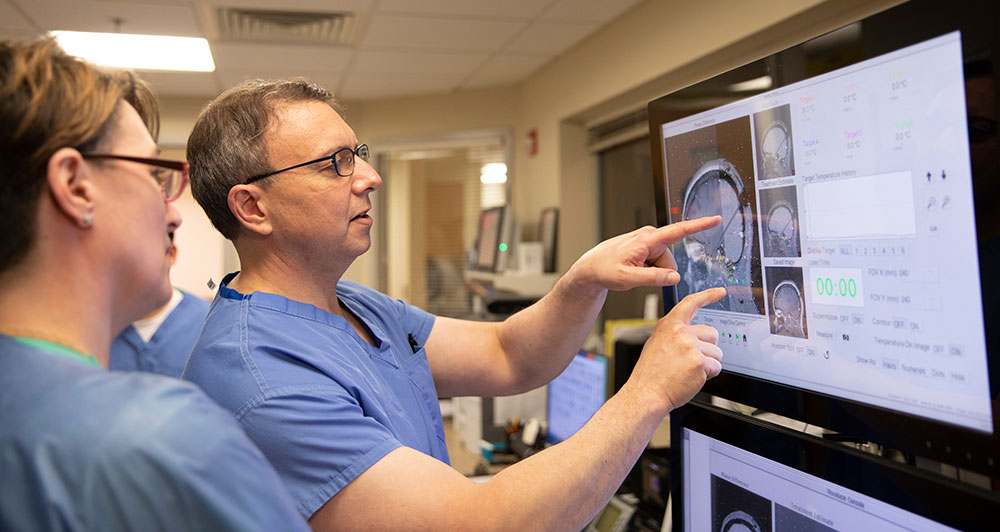Epilepsy can be a confusing and scary disease for the nearly 3.5 million people who have it. It can usually be treated by medications, but sometimes these medications do not achieve the desired result. People who are living with uncontrolled seizures are encouraged to seek evaluation and treatment from neurologists with specialized training in epilepsy, such as the physicians at Holy Cross Health's Level III Epilepsy Monitoring Unit.
Holy Cross Health experts, neurosurgeon Zachary Levine, MD, and epileptologist Gregory Mathews, MD provide answers to frequently asked questions about epilepsy.
What causes epilepsy?
We don’t know what causes epilepsy for about half the people who have it. For the other half, it is often caused by a brain injury such as head trauma or prenatal injury. Epilepsy can also be caused by stroke, genetic disorders, and other neurologic diseases such as Alzheimer’s.
Is there a cure for epilepsy?
There is no cure for epilepsy. But it is a treatable disease with medications or in some cases, with surgery. These treatments can control the seizures caused by epilepsy and improve the patient’s quality of life. The good news is that if one treatment stops working, a specialist can explore other treatment options, including surgery, to achieve better results.
Do environmental factors influence seizures?
Yes. Some people with epilepsy may have seizures that are proceeded by or provoked by external factors we call “triggers.” These triggers can be flashing lights, patterns, noises, or even food.
Can children who have epilepsy outgrow it?
Yes, many children outgrow their seizures. If a child remains seizure-free for 1 to 2 years while taking medications, we can slowly take them off medications. But it’s important that you follow your doctor’s instructions. You should never stop taking medication on your own.
Why do some people develop epilepsy later in life?
New cases of epilepsy are most common among young children. But epilepsy rates increase again for people over 55. There are many possible causes for developing epilepsy late in life. Strokes, brain tumors, or Alzheimer’s disease can all cause epilepsy. Additionally, traumatic brain injuries due to falls or blows to the head can lead to seizures.
What are the latest medications to control seizures?
The number of seizure medications has increased significantly over the last 20 years. According to the Epilepsy Foundation, there are more than 30 medications available.
One of the newest drugs was approved by U.S. Food and Drug Administration (FDA) in 2018 to treat very severe seizures caused by two rare types of epilepsy. It is made from cannabidiol, which is a form of medical marijuana.
Recently, the FDA approved the first nasal spray to treat seizures. It is a single-use treatment that can be administered by non-healthcare professionals, like an EpiPen, to treat unusual seizure activity in patients with epilepsy 12 years of age or older.
Are there new treatment options awaiting approval from the FDA?
Epilepsy research is a very exciting and active field of medical research. Scientists are working hard to develop new epilepsy drugs and treatments, some of which are currently awaiting approval by the FDA.
What is the latest treatment option for epilepsy?
The latest treatment for epilepsy is laser interstitial thermal therapy, called Visualase®. The procedure is much less invasive than open brain surgery and takes less than 90 minutes to perform. When a patient undergoes Visualase, a tiny fiber-optic thread directs laser energy with pinpoint accuracy at a precise part of the brain to remove or destroy the cells that cause seizures.
When is laser therapy a treatment option for someone with epilepsy?
People who are good candidates for laser interstitial thermal therapy are those with medication-resistant epilepsy or those whose seizures originate from an abnormal area in one section of the brain.
Are there risks associated with this treatment?
Laser interstitial thermal therapy is less invasive, but keep in mind that all surgery has some element of risk. Some general risks include complications from anesthesia, infection, bleeding, and tissue injury.
What other treatment options exist for epilepsy patients?
Learn More About Treatment Options for Epilepsy
Watch Zachary Levine, MD, medical director of Holy Cross Health's neuroscience program, and Gregory Mathews, MD, medical director of Holy Cross Hospital's epilepsy monitoring unit, discuss innovative treatment options for people struggling with seizures on their current medications.
Resources

Innovative Treatment Options
Treatment options to control seizures and improve each patient's quality of life.
Holy Cross Health presents the information in this blog as a resource for our community. It is not intended to replace professional medical advice or to endorse any particular entity or service. Personal health problems should be brought to the attention of the appropriate health professionals.


